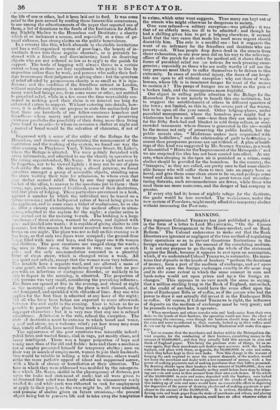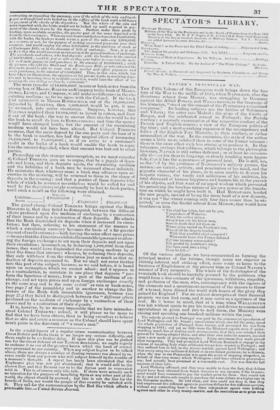BANKING.
THE ingenious Colonel TORRENS has just published a pamphlet in the form of a letter to Lord MELBOURNE, "On the Causes of the Recent Derangement in the Money-market, and on Bank Reform." The Colonel endeavours to make out that the Bank Directors are ignorant or negligent of the true method of regulating their operations so as to prevent disastrous fluctuations in the foreign exchanges and in the amount of the circulating medium. It is not our purpose to go through the whole of the statement against the Bank, because it appears to rest upon an assumpticin, which, if we understand Colonel TORRENS, is untenable. He main- tains that deposits in the hands of bankers "perform the functions of money, form a part of the medium of exchange, and act upon prices and upon the foreign exchanges exactly in the same way and to the same extent in which the same amount in coin and bank-notes would act upon prices and upon the foreign ex changes." This appears to us very much the same as saying, that a million sterling lying in the Bank of England, untouched, at the credit of anybody, would have the same effect upon the price of Exchequer Bills or of coffee, as if the person who had the power to draw it out actually did invest it in the Exchequer Bills or coffee. Of course, if Colonel TORRENS is right, time influence of deposits on the medium of exchange must be very great; and lie proceeds to explain bow it operates.
" When merchants and others transfer coin and bank-notes from their own desks to the hands of their bankers, the operation would not have the effect of contracting the currency, even though the bankers should keep the whole of the coin and notes transferred to their custody, locked up in their coffers until dt:..wn out by the depositors. The following illustration will make this appa- rent.
"Let us assume that the membants and dealers within the Metropolitan dis- trict require, for the conducting of their business, circulating money to the amount of 10,000,0001., and that they actually hold this amount in coin and Bank of England paper. This being the previous state of things, let us as- sume again, that these merchants and dealers open accounts with the London hankers, and place with them, as d4-posits, the 10,000,000f. M coin and notes, which they before kept in their own desks. Now this change in the manner of keeping the cash required to meet the current demands of the market, would not leave the merchant and dealer with a less command of money, with a less power of making payments and of making purchases than they before possessed. sty drawing checks upon their bankers to the amount of 10,000,0001., they can come into the market just as effectually as they could before have done by bring- ing out coin and notes to that amount from their own cash.boxes. If the whole of the 10,000,000!. in coin and note., deposited with the bankers, were locked up in their coffers until drawn out in payment of the checks of the depositors, this locking up of coin and notes would have no conceivable effect in depriving the depositors of the power of drawing cheeks and of making payments or pur- chases to the amount of the 10,000,0001. It is evident, therefore, that trans- ferring coin and bunk. paper from the desks of merchants and others, and placing them fur safe custody al bank deposits, could have no effect whatever either in contracting or expanding the currency, even if the whole of the coin and lank- piper so transferred were locked up in the coffers of the bank until withdrawn in payment of the checks of the eh positors. But the who!e of the coin and notes deposited with the banks would not be locked up until required in pay. ment of the checks drawn by the depositors. Bankers make their profit by lending, upon available securities, the greater patt of the sums deposited with
them their customers. When our merchants and dealers deposited 10010,0001. with die banks, the bankers would retain a part of the sum—say 2,000,000/. as a reserve, or rest, for the purpose of making occasional payments over their enuntert, and would employ the other 8.000,000/. in the puichase of stock or
rat' Exchequer Bills, or in the discount of bills of exchange. Now, it is self- ev'd t that this would occasion an extension of the genet al medium of exchange. The merchants and attars, who had deposits with the bankers to the amount 410.01,00U, would Fir just as able as they were befmc to come lido the mor- tal aid make payments and purchases to the amount of 10,000,0001. ; while the persons who sold the Stork and the Exchequer Bills, or who obtained the diseouds, woad be able to come into the market and ciPet imyments and ?nuke purchases, to the amount of 8,000,0001. Thus, in this ease, which has been taken for illustration, the operation of the private banks in receiving dim- s'is and in investing them in available securities, would have the effect of in- ce, «sing the cireulutiuy inolittat by 8,000,0001." The mere transfer of 10,000,000/. in coin or bank-notes from the strong box of Messrs. BARING a miCompany to the bank of Messrs. JONES, LLOYD, and Company, would make no difference in the cir- culating medium; so far we agree with the Colonel. If the bank lent 8,000,000/. to MOSSTS ROTHSCHILD out of the 10,000,000/. deposited by BaltuaGs, then 8,000,000/. would be put, it may be assutncd, into active circulation. Suppose, however, that EseINGS required their 10.000,000/. to invest in cotton, and drew it out of the bank : the way to answer their checks would be for the bank to recall its loan to ROTHsCHI LDS ; and thus the money
would have changed hands, but the amount of the circulating medium would not have been altered. Bot Colonel TORRENS assumes, that the mere deposit by the one party and the loan of it by the bank to another, has had the magical effect of increasing 10,000,000/. to 1 '4,000,000/.; as if an entry to a customer's credit in the books of a bank would enable the bank to repay him the amount deposited, when that amount was lent out to other parties.
Preceeding on this strange misconception, as we must consider it, Colonel ToanaNs goes on to argue, that by a juggle of depo- sits and loans, and then deposits again, the circulating medium and the liabilities of a bank may be increased almost infinitely. lie maintains that, whatever sums a bank may advance upon se- curities in the morning, will be returned to them in t he shape of deposits in the evening ; and that a portion of these deposits (the whole of which he assumes nevertheless would be called for and used by the depositors) Might continually be lent to fresh parties, until such a result as the following were obtained.
Coin. Securities. liabilities Depoiik. R0,000,000 Assets £10,000,000 ! ze90,000,00o
The grand charge Colonel TORRENS brings against the Bank Directors is, that they failed to distinguish between the different Effects produced upon the medium of exchange by a contraction of their issues and by a contraction of their deposits. He admits that the Bank dimiiiished its deposits when it increased its circu- lation; but then, referring to his statement of the manner in which a circulating currency becomes the basis of a far greater amount of credit currency—both having the same effect upon prices —he says that the Directors exhibited lamentable ignorance in allow- ing the foreign exchanges to act upon their deposits and not upon their circulation ; inasmuch as, by deducting 1,000,000/. from their issues, they would have diminished the circulating medium by at least live times that amount ; whereas, by reducing their deposits, they only withdrew from the circulation just so much as that re- duction of deposits amounted to. But we shall not enter further into this part of the subject, because, as we said before, it is based upon an assumption which we cannot admit: and it appears to us a contradiction, to maintain in one place that deposits " per- form the functions of money, form a part of the medium of ex- change, and act upon prices and upon foreign exchanges exactly in Me same way and to the same extent" as coin or bank-notes, (see page 7 of the pamphlet,) and in another to charge the Di- rectors of the Bank with lamentable ignorance, because (see page 27,) they failed to distinguish between the " different effects produced on the medium of exchange by a contraction of their issues and by a contraction of their deposits."
It is, however, by no means impossible that we have misunder- stood Colonel TORRENS indeed, it will please us far more to find that we have been obtuse, than to bring ourselves to believe that so able and acute a reasoner as the Colonel should have spent much pains in the discovery of " a mare's nest."



























 Previous page
Previous page